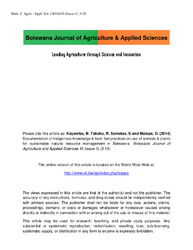| dc.contributor.author | Kayombo, B. | |
| dc.contributor.author | Tsheko, R. | |
| dc.contributor.author | Semetsa, S. | |
| dc.contributor.author | Malepa, D. | |
| dc.date.accessioned | 2019-09-25T07:42:15Z | |
| dc.date.accessioned | 2021-03-15T08:49:49Z | |
| dc.date.available | 2019-09-25T07:42:15Z | |
| dc.date.available | 2021-03-15T08:49:49Z | |
| dc.date.issued | 2014 | |
| dc.identifier.citation | Kayombo, B. Tsheko, R. Semetsa, S and Malepa, D. (2014) Documentation of indigenous knowledge & best–bet practices on use of animals & plants for sustainable natural resource management in Botswana. Botswana Journal of Agriculture and Applied Sciences 10 (issue 1) (3-10) | en_US |
| dc.identifier.issn | 1815-5574 | |
| dc.identifier.uri | http://moodle.buan.ac.bw:80/handle/123456789/209 | |
| dc.description | Original research | en_US |
| dc.description.abstract | A study was carried out to document indigenous knowledge (IK) and practice on use of animals and plants, and best-bet practices (BBPs) during Phase I (2003-2004) of the Desert Margins Programme (DMP), whose overall objective is to arrest land degradation in the desert margins of Africa through demonstration and capacity building activities. The documentation work was executed in Bobirwa Sub-district and Kgalagadi District using a structured questionnaire, the sample size of which depended on the identification ability of initial informants for more respondents. The study showed the importance of IK on the effective functioning of the traditional leadership to monitor-and-ensure adherence. Traditional leadership played an important role in protecting some animals and trees as well as continuously ensuring that there were active advisors to assist in monitoring the environment. The study further showed that past (indigenous and best-bet) practices were labour intensive and capable of exploiting limited amounts of natural resources which could only satisfy the needs at household level. The predominant existing practices in both districts are the harvesting practices. These practices such as selective cutting of trees, grass cutting using hands or sickle, and harvesting medicinal roots/tubers and replacing soil thereafter, have contributed to sound management of natural resources. Farming practices have, however, undergone some phenomenal transformation including the use of tractors for cultivating large areas across the slopes thus predisposing them to land degradation. | en_US |
| dc.description.sponsorship | BUAN | en_US |
| dc.language.iso | en | en_US |
| dc.publisher | Botswana University of Agriculture and Natural resources | en_US |
| dc.relation.ispartofseries | Botswana Journal of Agriculture and Applied Sciences;Vol. 10 (Issue 1) 3-10 | |
| dc.subject | Indigenous knowledge (IK) | en_US |
| dc.subject | Best-bet practices (BBPs) | en_US |
| dc.subject | Resource management | en_US |
| dc.title | Documentation of indigenous knowledge and best-bet practices on the use of animals and plants for sustainable natural resources management in Botswana. | en_US |
| dc.type | Article | en_US |

